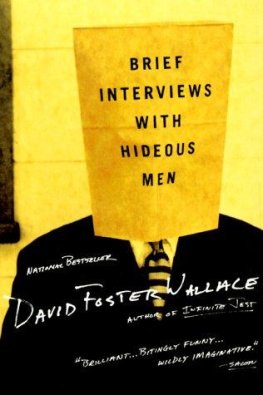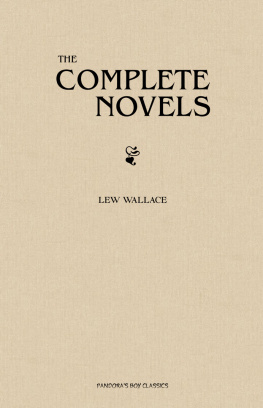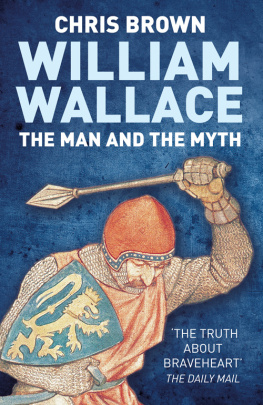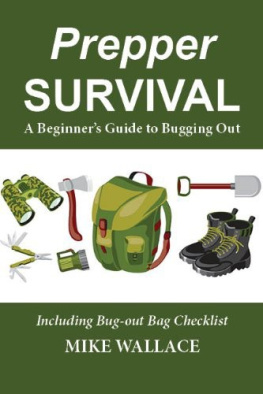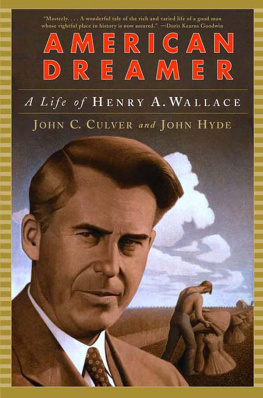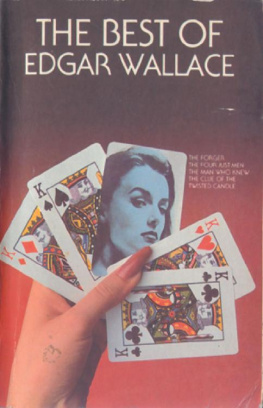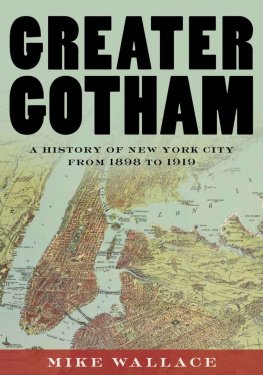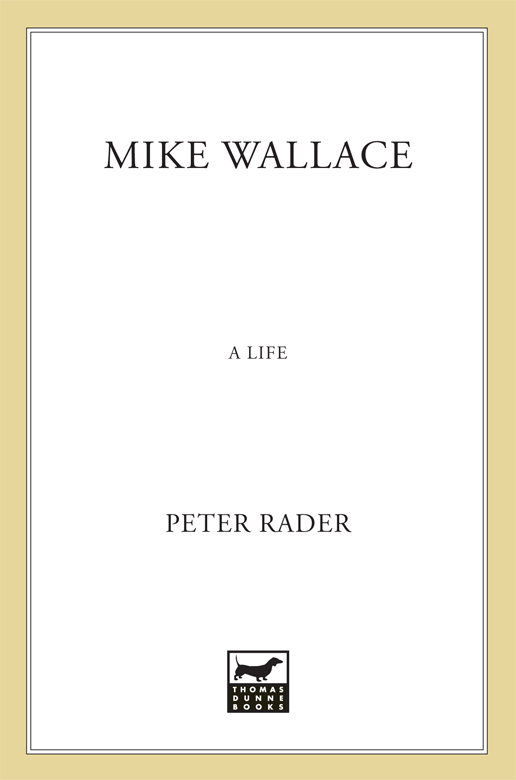
For Paola, Matteo & Luca
Contents
Introduction
Chapter One
Chapter Two
Chapter Three
Chapter Four
Chapter Five
Chapter Six
Chapter Seven
Chapter Eight
Chapter Nine
Chapter Ten
Chapter Eleven
Chapter Twelve
Chapter Thirteen
Chapter Fourteen
Chapter Fifteen
Chapter Sixteen
Chapter Seventeen
Chapter Eighteen
Chapter Nineteen
Chapter Twenty
Chapter Twenty-one
Chapter Twenty-two
Chapter Twenty-three
Chapter Twenty-four
Chapter Twenty-five
Chapter Twenty-six
Chapter Twenty-seven
Chapter Twenty-eight
Introduction
The Two Faces of Mike Wallace
When Wallace gets that look on his face, when his dimples dimp, you know that the bad guy is about to get zapped. Theres no warmer moment in all of Television Land.
R ICHARD C OHEN , T HE W ASHINGTON P OST
The phone call came on a chilly day in February 1980. Bill, said Jimmy Carter, I really hate to bother you.
Thats perfectly all right, Mr. President, responded CBS News chief William Leonard.
Bill, continued the president, 60 Minutes is a very important show, and this is a critical time in the history of our country. We think its very important for the country that you all dont run that program, or at the very least postpone it until this hostage thing is resolved.
Carter was referring to The Iran File, an explosive Mike Wallace news story scheduled to air in two days time. The Shah of Iran had been deposed the previous year in an Islamic revolution that brought about the rise of a fundamentalist regime. After the Carter administration granted the exiled Shahs request to enter the United States in October 1979 for medical treatment, livid Iranian students seized the U.S. embassy in Tehran, taking sixty-six Americans hostage.
If the so-called War on Terror has a beginning, it was herethe moment that America first experienced a broad display of Islamic fervor in its chilling potential to capture global headlines and endanger significant numbers of American lives. Mike Wallaces upcoming report suggested that we had only ourselves to blame for this aggression; the piece was a scathing indictment of the U.S.s three decadeslong role in propping up the Shah and funding SAVAK, his brutal secret police. Indeed, the hostage crisis was to last 444 days and become an international humiliation that would doom Carters presidency.
Iran was the biggest news story of the day and Mike Wallace, the biggest newsman on the biggest news show in history, was all over it. He had already landed the ultimate scoop by getting the first-ever television interview with Irans new Supreme Leader, militant Islamist Ayatollah Khomeini, who had been largely responsible for fomenting the Iranian Revolution from his base in exile. And now Mike had exclusive insider accounts of how the CIA had trained SAVAK in brutal interrogation and torture techniques. No wonder the White House was pulling out all the stops to kill the segment. But to have the Commander-in-Chief himself make the calla sitting president personally begging a newsroom not to run a story spoke volumes about the power of Mike Wallace, the man who changed the face of TV journalism.
I hope youll give it every consideration, repeated the beleaguered president.
You can be assured that I will, Mr. President, responded an astonished Bill Leonard.
Well, I very much appreciate it, Carter signed off.
Shaking his head in disbelief, Leonard summoned Mike into his office to solicit his thoughts on the matter. Wallace, a reporter who took pride in staring down terrorists, mass murderers, divas and dictators, had never been one to pull punches. Standing up to a U.S. president was just business as usual for him. He insisted that his piece should air. And so it did, just one of the thirty blistering segments that he would file in 1980, a prolific year that vaulted 60 Minutes to the number one spot in the Nielson television ratingsa triumph the show would repeat five times.
The dazzling popularity of 60 Minutes , which ranked in the top ten TV shows for twenty-three seasons in a row, is unique in the history of broadcasting and will likely never be matched. By the measures of ratings and profitability, it is the most successful program of all time, a monumental feat due in large measure to the journalist we know as Mike Wallace.
And, in the winter of 1980 when Mike added a U.S. president to the roster of those who had begged for his mercy, he seemed to be at the top of his game. Wallace commanded a movie-star salary as well as the accompanying fame and mystique. The four most dreaded words in the English language, boasted a banner ad that appeared in newspapers coast-to-coast: Mike Wallace is here.
In a few short years, however, Wallace would hit rock bottom in an abyss of suicidal despair. He would find himself wading through netherworlds of melancholy, where moment-to-moment survival required monumental effort. The darkness would be everywhere; the choices few. One bleak evening, he would have his stomach pumped in an emergency room after taking enough pills to make him sleep forever.
It came as a shock to all who knew him, for he had gone to great lengths to conceal his dark side, even from himself. The public saw him as a barracuda, the man who raised intimidation to an art form. Yet his bravura was a carefully crafted front to conceal the deep troubles that had tormented him since his youth.
I was not a happy kid, he admitted. Back in those days, I remember the sick, gray days were better. Because when it was sunny, Id feel worse.
His early melancholy stemmed in part from his overbearing and chronically depressed mother, Zina, who clung to Mike (the youngest of four children) after the others had left home. Mikes adolescence, moreover, was marked by a case of acne so severe that it left both emotional and physical scars that persisted well into adulthood. Being fifteen, sixteen years old in high school and not wanting to even look at yourself in the mirror is very hard, lamented Mike.
For decades, Mike remained deeply insecure about his physical appearance, ironic for a man whose outer image bordered on the omnipotent. Critics would remark that his pockmarked, prizefighters face served to enhance the abrasive tone of his interviews.
Mike Wallace was indeed a master pugilist, but hes a fighter with a past that haunts him. While many regard him as the most formidable newsman of his time, for the better part of his career he harbored gnawing insecurities about his journalistic credentials. Thats because it took yearsdecades, reallyfor Wallace to command even a modicum of respect in the newsroom. Journalists would snigger behind his back and even to his face: Youre no reporter. Youre a fraud. An actor, reading lines. And they were right.
Mike Wallace, before age fifty, was what many would call a television personality. A breezy raconteur who hosted chat shows, quiz shows and the like, he was the pitchman for Parliament Cigarettes and Fluffo shortening from Procter & Gamble. His baritone voice announced the arrival of The Green Hornet. He emceed third-rate beauty pageants and daytime game shows. He even did a stint on Broadway as a hustling art dealer in a mediocre comedy, Reclining Figure , which ran for an unremarkable one hundred performances. In short, he dabbled here and there, earning decent paychecks across the entertainment world. Author Gary Paul Gates, who collaborated with Mike on both of his memoirs, puts it bluntly: Wallace practically wallowed in schlock.


